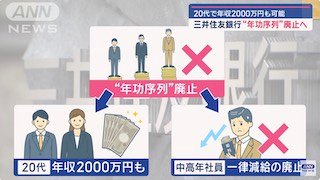TOKYO, June 22 (News On Japan) – The long-standing seniority-based system in Japanese companies is being phased out. Many have considered it normal to rise with age, but there have been times when people desired recognition based on ability. With this deeply entrenched system now under review, will a major bank’s decision change Japan’s corporate culture?
It has been revealed that Sumitomo Mitsui Banking Corporation, one of Japan’s three megabanks, is planning a major overhaul of its human resources system. One of the most important changes is the abolition of the seniority-based system. Currently, salaries and positions increase with years of service. Sumitomo Mitsui, which has about 30,000 employees, plans to abolish this system within two years. The bank wants to switch to a performance-oriented system.
The seniority system was introduced during Japan’s post-war economic boom to ensure long-term employment. Megabanks, which have historically hired large numbers of graduates, have adhered vigorously to this system. What is the main goal of Sumitomo Mitsui? The bank wants to attract and retain talented people. It is expected that recognizing and rewarding young professionals for their contributions, regardless of age, will strengthen their appeal to the younger generation. It will also ensure that even older employees who deliver results are appropriately rewarded. The key point is that under the new system, even a twenty-something could earn an annual salary of 20 million yen based on performance.
This measure also abolishes the automatic reduction in salaries for middle-aged and older workers. How do people on the street experience this change? Opinions are mixed. One man in his 40s welcomes the end of the seniority system as he believes it benefits the younger generation. Another forty-something appreciates the predictability of the old financial planning system. A bunch of twenty-somethings expressed divided opinions; one felt motivated by the change, while the other was concerned about the risk of salary decline.
Business leaders also have differing views. One executive supports the idea, emphasizing the desire to reward top performers, regardless of age. However, evaluating skills remains a challenge.
Experts believe that the abolition of the seniority system by a major bank represents a significant shift. They expect this change to also affect smaller companies. Small and medium-sized enterprises (SMEs), struggling to secure talent, are likely to follow suit in adjusting their pay structures. The collapse of the seniority system is expected to accelerate rapidly.
From the employees’ perspective, it is a challenge to determine which system is better. The current pressure on Japanese companies to attract top talent to remain internationally competitive underlines the urgency of such reforms.
Source: ANN



